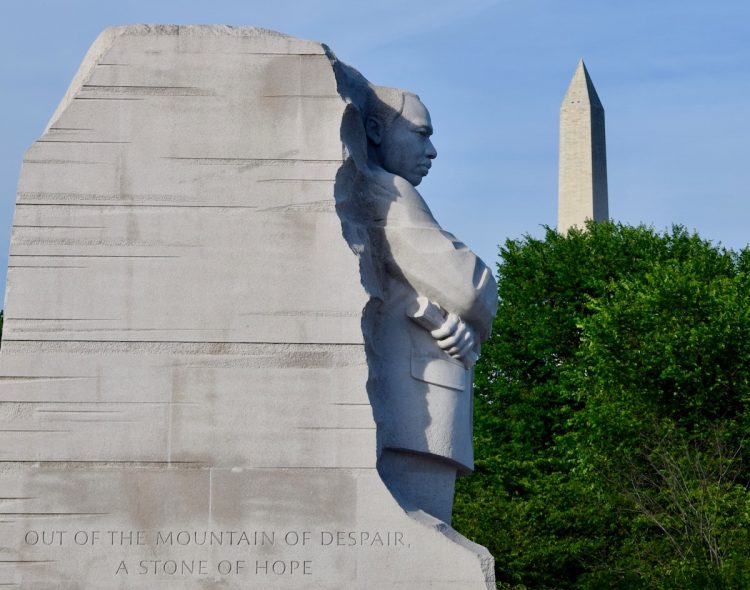Editor’s Note: the original version of this post was distributed to the University of Dubuque community in mid-January 2021. This version has been edited slightly for my blog.
Several of you have inquired about whether I have any plans to offer remarks on the recent events in our nation’s capital or whether I will have words to share on the occasion of Martin Luther King Jr. Day this coming Monday, January 18, 2021. As I consider a response, I am reminded of a story told by Fred Craddock, a homiletician whom I greatly admire, about an Arapaho-Cheyenne native woman named Molly Shepherd. On the occasion of the assassination of President John F. Kennedy, Ms. Shepherd wrote, “Molly has no words for you today. Molly has nothing to write today. Molly has no words today. Molly goes through the house all day saying, ‘Oh…” Ms. Shepherd’s response, devoid of words, were the best remarks of all.
To understand me, as your President, you must first understand that I come from a background where words matter. I grew up in an environment where words were used destructively; they brought pain and harm to people nearest me. I was ordained into a vocation where I served and earned my living by using words to share the Good News in the midst of the lives of congregation members who struggled with alcohol and drug addiction, success, neglect, poverty, a failed business, death, or even infidelity. Early in that career, I earned a master’s degree in rhetoric — yes, rhetoric. Rhetoric is essentially the careful study of words, often defined as “the available means of persuasion.” As ludicrous as it may sound, I have spent the better part of 12 years of formal education studying words: their use, misuse, power, promise, and potentially destructive influence. So words matter to me in ways that are, admittedly, somewhat out of the ordinary. But I posit that the careful use of words should matter to each of you — each of us — as well.
I am not the least bit surprised by the recent events at our nation’s capital. As a student of words, this sad, shameful, destructive moment in our nation’s history has been brewing and escalating for decades. It reached a frothy crescendo on January 6, 2021, for all the world to see and it took place in what we once knew as the cherished epicenter of democracy; that place were words are ostensibly used to debate, discuss, disagree, and, hopefully, come to some kind of consensus for, we, the people. I am 61 years old, and I don’t honestly remember the last time I listened to an informed or respectful exchange of ideas coming from our nation’s capital. That needs to change. Perhaps one of you will be that change one day.
But here’s the thing: people in positions of leadership should understand that the higher one ascends the leadership ladder, the more circumspect a leader needs to be in their use of words. Because words matter. They have the power to heal and destroy; the power to build up and break down. Whether we are an older sibling, parent, pastor, city council member, representative, senator, ambassador, or president — words matter. They rhetorically construct realities; words create worlds.
I believe that the two greatest rhetorical leaders in our nation’s history — President Abraham Lincoln and Dr. Martin Luther King Jr. — are understood as being great leaders because, among other attributes, they were purposeful in their use of words. They knew they were being listened to. They knew they were being recorded. They knew they were being watched. One was uneducated and the other had a PhD. One came from complete poverty and deprivation, and the other came from a background of standing but experienced deprivation because of the pigmentation of his skin. Lincoln gave us his second inaugural address, one of the world’s greatest speeches, and he was assassinated 42 days later. King’s last sermon, “I’ve Been to the Mountaintop,” which, in my opinion, is his best speech, was given on April 3, 1968, at the Mason Temple, which was the Church of God in Christ headquarters in Memphis, Tennessee. He was assassinated the next day. Though I don’t have the space to do so here, I want to encourage each of you to read, or in the case of “I’ve Been to the Mountaintop,” listen to these two speeches. Compare them — each of them — to what you are reading or hearing today. Think about the words Lincoln and King choose to use, neither one of which was scripted by an aide, and why they used the words they used in that particular moment in time and history. Each foretold a future. Each reached beyond the impossible and invited us to consider a yet more excellent way. Each wanted to move an unwilling citizenry to a better place, and each reminded us that we, indeed, had better angels among us. Perhaps one of you will lead us in that way one day.
I have no doubt that both Lincoln and King understood that they would be assassinated because of the positions they took and the directions in which they were trying to lead the country. Each of them had families they loved. Each of them were imperfect humans. And each of them are revered by the country — and the world — as leaders worthy of remembrance. As you read the speech and listen to the sermon think carefully of the words that you use, in this 100 acres, known as the University of Dubuque. Think of your posts on social media. Think about how you lecture in a classroom or participate in a Student Government meeting. Think about how you wish to be remembered. Think about the causes or efforts with which you want to be associated. Let your words begin to create the world you wish to see.










